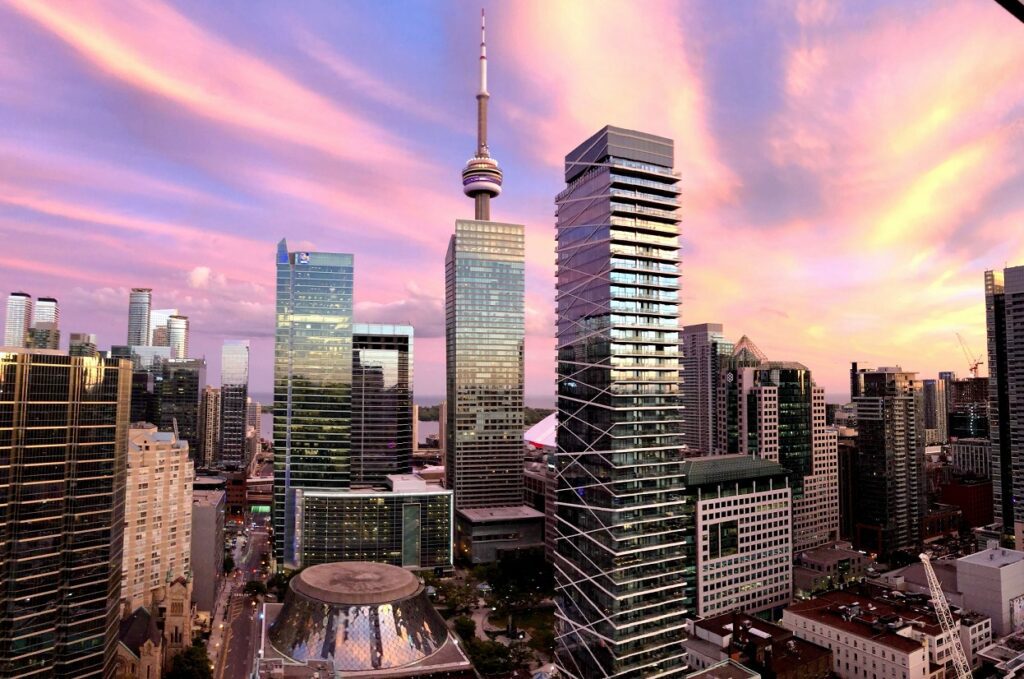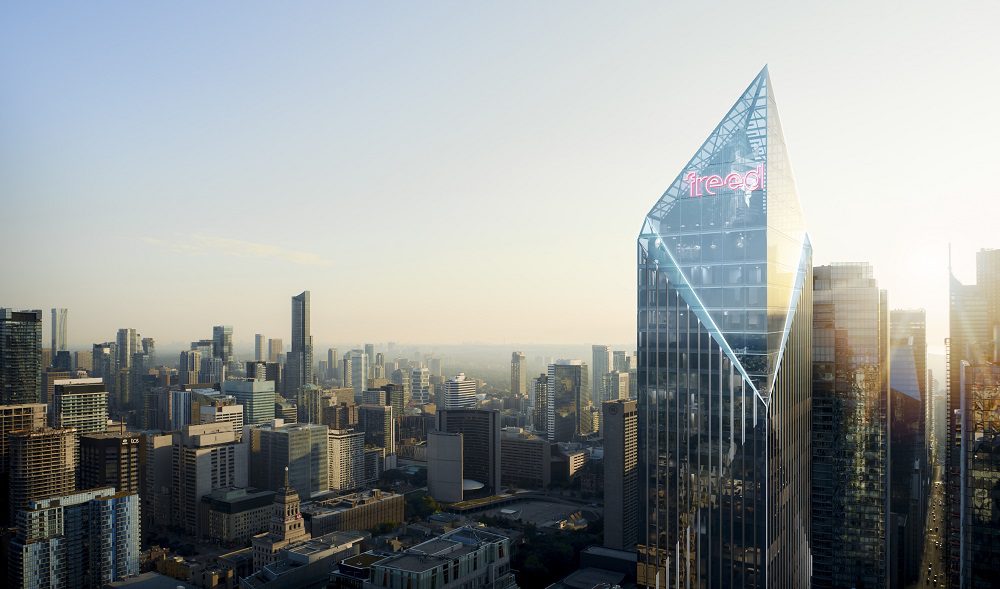I get asked this all the time, and the simplest answer is, “it depends.”
There are a host of factors that determine how high or low a building’s condominium fees are, but that’s a topic we’ve covered before.
Today, let’s just look at the simple numbers, or ranges, for what condo maintenance fees can be in Toronto, and go through some very basic fundamentals of maintenance fees before we even get into the calculations…

I know I’ve written about maintenance fees before, likely on several occasions over the past few years.
So at the risk of being repetitive, here’s a quick list of the factors that can, and most often do, affect the maintenance fees:
1) Age of building
2) Size of building (physical size: height, square footage, levels/storeys, etc)
3) Size of building (number of units)
4) Amount of Amenities
5) Number of on-site personnel
6) Management
I might be tempted to say that’s the order of importance as well., and while there are other factors, those are the most influential.
Those are the factors that will have the biggest affect on maintenance fees, but today I want to look at the actual cost of the fees and what is good, bad, or terrible, and in order to do that, I should probably lay out a few “ground rules” first.
These are either a brief refresher for you, or something that will now help you to understand fees better:
1) Maintenance fees, in 99% of buildings, are calculated by square footage.
This is laid out in the condominium’s declaration, and it’s most likely those boring pages you skipped through that look like dot-matrix code from the 80’s.
With a few exceptions in Toronto, every condo apportions maintenance fees based on the square footage of the interior of the unit.
The exterior of the unit, ie. balconies or terraces, is considered “exclusive use, common elements,” and thus does not apply.
So if John has a 500 square foot condo with no balcony, and Mike has a 500 square foot condo with a 350 square foot terrace in the same building, they both pay the same maintenance fees.
When you’re evaluating condo fees, you’re going to use the “per square foot” method, just as you would for the value of a condo itself.
2) Parking spaces and lockers cost extra.
I can’t say that this is in 99% of buildings as well, but just about.
So if John has a 500 square foot condo and his fees are $350 per month, and Mike has a 500 square foot condo in the same building, and his fees are $385 per month, you can almost guarantee that Mike has a parking space.
Parking spaces will add anywhere from $30 – $80 in most buildings (excluding so-called “luxury” buildings and outliers), and lockers perhaps $5 – $25.
Some buildings will actually separate the two costs, like at the Merchandise Lofts, for example, where you pay your maintenance fees, and then you pay your parking maintenance fee seperately.
3) You have to account for utilities.
We’re comparing apples to apples, after all.
Just as I find it incredibly misleading and naive for somebody to quote a “price per square foot” for a condominium with a parking space, and compare it to one without, you can’t really compare maintenance fees per square foot in a building where you pay your own heat and hydro, versus one that’s all-inclusive.
When it comes to maintenance fees, there are three major items that may, or may not, be covered in the fees:
1) Heat (gas)
2) Hydro (electricity)
3) Water
I’m using “Heat” and “Hydro” because that’s what MLS uses, but “Gas” and “Electricity” makes it a hell of a lot more clear!
In older buildings, all three are usually part of the maintenance fees.
In middle-age buildings (and in Toronto, that means a 10-15 years), water and heat are included, but hydro is separate.
In new buildings, only water is usually included, and both heat and hydro are separate. In fact, in many new buildings all three of heat, hydro, and water are often paid separately.
So if you live in a building with $0.50/sqft maintenance fees, you might not want to brag to your friends about how cheap that is, when you’re paying your own water, gas, and electricity each and every month.
4) Watch out for the hidden HVAC rental!
As I wrote in the blog about Urbancorp last week, some of their projects have (or had) monthly charges of around $120 for the HVAC (heating, venting, air-conditioning), and/or the hot water tank.
This is very common in condo townhouses where each unit has their own system.
But some sneaky developers in standard condo-apartments have put rental units in.
So if your fees are $0.50/sqft, and you pay your own water, heat, and hydro, AND you’re renting the HVAC and/or hot water tank each month, your fees could actually be double.
5) Amenities are not free.
This should go without saying.
But having said that, there are some buildings with very low fees that do have great amenities as well.
That’s a testament to management, and perhaps to the quality of the condo’s construction, and it’s always nice to see.
But if you’re looking for a building with a gym, a pool, a movie theatre, a billiard room, an a 24/7 concierge, don’t be shocked when the fees are higher than average.
6) There is an inverse relationship between price and fees.
Perhaps this is the “conclusion” and not merely the sixth point.
But you should have this in your head already.
Consider two very similar condominiums, both 1-bed, 1-bath, similar age, location, etc.
One of the units has fees of $350 per month, and one of the units has fees of $600 per month.
The first unit costs $399,900. The second unit costs $359,900.
That makes sense to you, does it not?
That extra $250 per month, is going to cost the owner $3,000 per year, and over three, five, or ten years, it’s going to cost them more to live there. It seems to reason that the condo should cost less, does it not?
Of course, some people just don’t like writing a big cheque every month, and thus the math doesn’t always make sense.
People will pay a lot more for a condo if it has lower fees, and the amount they will pay is not always proportionate.
People looking at a building with higher fees will often say, “Well I can handle paying more each month to get a deal on it today, but, if the fees go up even higher, what will they be like when I go to sell? Will it be even tougher? Will my resale value be hurt?”
So the higher the fees, the lower the price.
And the higher the fees, the tougher the condo is to resell.
–
Now with all those qualifiers out of the way, let me get into the actual answer here to “how much should my condo fees be?”
As I said at the onset, “it depends.”
Bit of a sidebar here, but after I wrote an article about condo fees for the now-defunct “The Grid” magazine, I got an angry call from a woman complaining about the column.
It was so strange. It was like I was Mike Wilner on “Jays Talk” and I said Jose Bautista was an awful baseball player, and “Eddie from Oakville” called Fan590 to disagree.
She said, “You didn’t account for amenities! I have a gorgeous pool in my condo!”
I told her that she was paying extra for that pool, and that somebody else might not want a pool.
She told me about the garden on her rooftop and how beautiful it was.
She scolded me until I eventually told her, “I can’t help you with any of thus,” and quietly hung up.
So the point is this: if your fees are $0.89/sqft, and you have a pool, hot tub, virtual golf simulator, and bowling alley, you’d better use those every goddam day, or your fees are “high.”
For the purposes of the numbers below, let’s assume these fees include two of the three utilities, so if you’re paying all three – make that adjustment. And if you pay none, then good, your net fees are even lower.
So let’s divide this into five categories:
1) Pre-construction
Your fees are only $0.31 per square foot? In pre-construction?
Congratulations!
You’re a moron. And I have some swamp land in Florida I want to sell you. Seriously, it’s beautiful – you can build a house on stilts!
When you see the maintenance fees quoted in marketing material for “new condos,” don’t even look at it. Don’t absorb it, don’t think about it, and above all, don’t let it influence your purchase decision.
Those numbers are meaningless.
The developer should just put $0.22/sqft, or something even crazier, just on the off chance somebody might believe it.
I wouldn’t have even mentioned this, except that once in a while when I talk about fees, somebody will say, “What about XYZ Condos? Their fees are only going to be $0.32/sqft! So why are you saying that ‘low’ would be like $0.60/sqft?”
I actually feel dumber for even having addressed that…
2) $0.50 to $0.64 per square foot
This is what I would consider “below average.”
I know it’s a big range, so you’d be correct to assume that $0.50/sqft is “low,” and that $0.65/sqft is creeping towards the average.
If you’re in a building with fees anywhere in the $0.50’s, and this isn’t a 1-2 year old condo, then congrats – your management is awesome.
And no, it’s not only new condos.
25 The Esplanade has fees around $0.47/sqft, and it was built in 1987. It’s the best managed building in the city, and it has lots of amenities, and two 24/7 concierges, so the fees aren’t low because this is a stripped-down building.
3) $0.65 to $0.75 per square foot
This is what I would consider “average.”
My gut feeling is that $0.70/sqft is average. But there has to be some give and take here.
So looking at this from the outside, and thinking about how I would address this with a client, I wouldn’t say that $0.65/sqft is “low.” I’d probably see that and tell a client, “these are less than average.”
By the same token, I wouldn’t say that $0.75/sqft is “high,” but I would tell a client it’s higher than average.
Anything in this range is quite acceptable, and extremely common. No cause for concern, but you’re not breaking the bank.
4) $0.76 to $0.89 per square foot
This is what I would consider “high.”
Maybe “higher” is fair for $0.76, and “high” is fair for $0.89, but you get the picture.
5) $0.90 per square foot
Maybe the “9” is a psychological number.
But anything “in the 90’s” is what I would consider “really high.”
–
So once again, with all that in mind, you need to determine if the building has amenities that make up for the higher fees, if you’re getting a break on the price that justifies paying more each month, or if there’s something else about the situation that allows you to accept the fees for what they are.
I’m seeing a bit more of a trend toward low-fee, low-amenity buildings these days.
Not entirely; that wouldn’t be fair to suggest.
I have a three couples with kids right now looking for condos with amenities, since their kids will use them, and it saves them time, money, and the aggravation of getting kids ready, into the car, and over to the community pool in the summer.
But for most young, single, working-class downtown’ers, I think they just don’t have the time to go bowling in their condo amenity room because they’re too busy paying off their mortgage…































Appraiser
at 8:34 am
Excellent article. Very informative and truthful. imho…
Dave
at 9:33 am
25 The Esplanade gets extra income from renting out their parking spots to the residents and general public.
When you see buildings like Indigo on Lombard, they are actually proud and happy with their $1+/sq ft maintenance fees. Scary.
H Marshall
at 11:33 am
Condo fees are so deceptive. Boards are known to keep the fees artificially low and ignore major repairs on everything that the residents don’t see, in order to keep the unit prices high and to please the landlords who rent their units.
Look at the audited financial statements very, very carefully.
JC
at 11:40 am
Hi David,
Here is an interesting situation. What about townhouses and condos being a part of the same condo corporation and paying a slight cheaper condo fee vs the condos. (it is not physically part of the condo building, it’s near by). Are there ways for the owners to unite and have a divorce? Because even though it is lower, it is still not as low as standalone condo townhouses whom only pay $200 ish for the common element and roof repair etc.
thanks!
JC
at 11:59 am
to add to that, I guess I just don’t think it is completely fair that the townhomes have to contribute towards a blend reserve fund and be tied into the condo building as townhome maintenance cost is likely a lot lower right
Wayazeer
at 1:17 pm
Though most units include a parking space (but not hydro/heat), fees in the new Regent Park buildings are rather high, it seems, with 10% yearly increase (i.e. 1 and 25 Cole). The common denominator seems to be management: Daniels Home Management Corp.
Joe Q.
at 2:31 pm
I’m not in the condo world, but I’d imagine it would also be helpful to see how condo fees evolve over time — as a function of the year of building construction, of the builder / developer, of amenities, etc.
A graph showing how condo fees in particular buildings have changed since construction would be very illuminating. Reflects the true cost of ownership over time.
Alex
at 8:27 pm
Hi David,
I ran into 2 interesting buildings 1 and 3 Concord Pl. in the DVP-Eglinton area.
They were 2 older buildings with all imaginable facilities but the maintenance fee was around $0.40 or $0.45.
No one could explain why. Then I figured out they were co-ops.
Though the difference between a co-op and a condo is clear but why the fee would be so low is still a mystery to me.
I’d love to hear your opinion.
Josie
at 10:38 am
Co ops are not required to meet the legal requirements under the Condominium Act – they operate in a similar manner, but are a different animal altogether. There are very few in Ontario (comparitively speaking) and there are tons of reasons why their fees can legitimately be that low. By the way, a lot of mortgage lenders will not touch them, there are only a few that finance co op purchases. Of course, they could also be that low because they are not maintaining a reserve fund for example. (It is good practice, but not a requirement under current law I believe) Take a careful look at the financials (or hire someone who knows the ins and outs of this) and that is where you will find your answer. Could be great, and could be a disaster waiting to happen, or anything in between.
Tom LePage
at 12:20 pm
When I read an article/blog post like this, it confirms that Realtors are doing a disservice for the overall condo ownership in Ontario. Influential Realtors, like yourself, have a very important role to play to assist current and future condo owners to truly understand the cost of condo ownership.
Condominium Owners monthly financial obligation should never be referred to as maintenance fees but Condominium Fees which include two totally separate condominium financial requirements.
1) Day to day operations which will vary per condo dependent on the many variable which you have mentioned BUT ongoing maintenance is only one aspect day to day operating costs, additional costs such as insurance is just one example.
2) Reserve Fund contributions is the other separate financial requirement.
If Realtors insists on breaking down condo fees based upon square footage (not maintenance fees) then the breakdown MUST include the day to day operating costs per sq ft and reserve fund contributions per sq ft and both of these totals will be the owners condo fees obligations. .
In the article, you gave a list of six items that effect condo fees which did not include reserve fund contributions – WHY? In a high-rise reserve fund contributions can easily be 20% to 35% or more and in a townhouse situation the reserve fund contributions can be over 50%. It is extremely important that all Realtors understand this point so their knowledge can be passed onto their clients.
Your example of the two units and their condo fees including your conclusion “People will pay a lot more for a condo if it has lower fees, and the amount they will pay is not always proportionate.” is based upon ignorance and this, from a Realtor, is simply wrong.
The public and condo ownership requires assistance in the understanding condo ownership and the most logical profession to do so are the Realtors – there should be a push for a condo sales licence for agents wishing to make a living selling condos.
Robert J. Sawyer
at 1:46 pm
Thank you so much! I found this very informative!